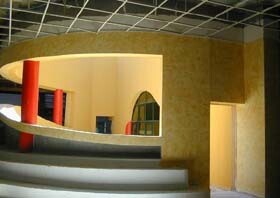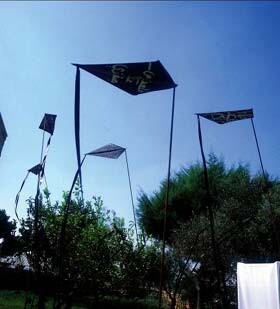Qattan Foundation 24 December 2003

The Qattan Centre for Educational Research & Development Library in
Ramallah
Despite the continuing deterioration of life in Palestine in the last three years, the A. M. Qattan Foundation’s Culture and Science Programme enters its fifth year with a number of substantial achievements. As well as continuing to support a number of young artists and creators to reach new stages in their development, the programme has initiated a number of modules for 2004.
When the programme was launched in 2000, it included fifteen prizes and grants with a value of $70,500. In 2003, the number of awards and prizes exceeded 30 and reached a total value of $147,500, an increase of 109 percent, despite the obstacles and disruptions affecting all sectors of life under occupation.

The interior, currently in progress, of the Qattan Centre for the Child in Gaza
The last few months have brought several tragedies to the Palestinian cultural milieu. In September, we lost Edward Said, a long-time friend of the Foundation; a fire killed the artist Mustafa Hallaj in Damascus; and in August, we lost two of our most promising young artists in a tragic drowning accident: Hassan Hourani and his young nephew Samer Abu Ajamieh. With our programme’s support, Hassan had been working on a wonderful illustrated book project in which the character of Rihan roams the world in search of the rose of love. The work has all Hassan’s characteristic wealth of imagination and humanity. Hassan had also been one of the winners of the Young Artist Award in 2000. After consulting with his family, we have now decided to publish the book in as complete form as possible and to name the biennial Young Artist Award after him, an award in which we had hoped his brilliant young nephew Samer would have taken part.
The Programme launches a new module in the audio-visual arts. As with other sectors, the module will be developed after thorough consultation with members of the profession. This consultation will take the form of a short census, as well as a series of questions relating to material needs, funding, technical issues, training etc. The results will then be put on a database and published on our web site. More importantly, they will form the basis of a long-term funding programme for the sector. We hope to publish these results by the end of March 2004 and the funding modules a few months later. Moreover, and in line with its commitment to publish artistic work by Palestinians or those related to Palestine, the Programme will develop a publishing programme for audio-visual works by Palestinians or on Palestine. Please check our web site for updates.
The 2004 programme is thus substantially enriched compared to last year, with a total commitment of $225,000.
Juries

“Tayyaret Waraq” by Iman Abu Hmid, one of the winners of the Young Artist
Award 2002
In order to preserve the prestige and reputation of its Programme the Foundation reserves the right to withhold any of its prizes and grants if it deems that the works or projects in question have not reached high enough levels of achievement or excellence.
Winners of the first prize, grant or award in the following fields may not apply for the same prize, award or grant in the same field in the round following the one in which they had previously won a first prize, award or grant: the Literature Awards, the Young Artist Award, Theatre and the Performing Arts Grant and the Journalism Prize.
The Foundation reserves the right to refuse any application for any grant or prize if the entry in question is incomplete and/or has not fulfilled the relevant criteria.
The Foundation will not return any documents it receives from applicants. All documents are sent to the Foundation’s offices at the sender’s sole responsibility.
The 2004 Programme includes grants and prizes in music, theatre and performing arts, the visual arts, literature, art residencies, the audio-visual arts and an extensive programme of on-going cultural activities. Please visit our website for further details.
General Parameters The Culture and Science Programme is based on the following general parameters:
The English translation of these guidelines is for information only. In case of confusion arising from an erroneous or imprecise translation, the Arabic original shall be considered final. If you would like to view the guidelines in Arabic, please visit our website or contact the programme co-ordinator, Mahmoud Abu Hashhash (contact details below).
CONTACT INFORMATION
PALESTINE
Adania Shibli
Programme Co-ordinator
A.M. Qattan Foundation - Palestine
Culture and Science Programme
PO BOX 2276
Ramallah,Palestine
Tel: + 972 2 296 05 44
Fax: + 972 2 298 48 86
E-mail: adania@qattanfoundation.org
www.qattanfoundation.org
UNITED KINGDOM
Omar Al-Qattan
Programme Director
A.M. Qattan Foundation - UK
Culture and Science Programme
5th Floor
5 Princes Gate
London SW7 1QJ
United Kingdom
Fax: + 44 207 581 87 74
Fax: + 44 207 581 07 41
E-mail: omar@uk.qattanfoundation.org
www.qattanfoundation.org
The A.M. Qattan Foundation is a charitable institution founded in 1994 and registered as a charity in the United Kingdom (company no. 2171893, charity number 1029450). In order to guarantee sustainability, independence and the highest level of services, the Al-Qattan family underwrites the financing of the Foundation’s administration and the establishment of its projects and programmes, as well as their running costs. A branch of the Foundation was registered in the Palestinian Territories in 1998.